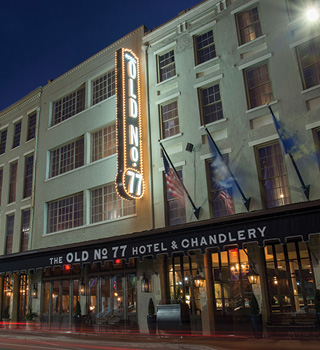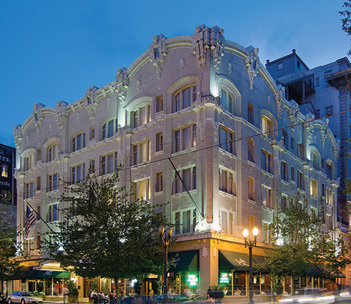- Home
- Media Kit
- Current Issue
- Past Issues
- Ad Specs-Submission
- Ad Print Settings
- Reprints (PDF)
- Photo Specifications (PDF)
- Contact Us

![]()
ONLINE

An Integrated Owner/Operator of Lifestyle Hotels
Editors’ Note
Bashar Wali has held his current post since October 2006. Prior to this, he held roles as Vice President-Grand Heritage Hotel Group; General Manager, Wyndham Worldwide; and Hotel Operations for Starwood Hotels & Resorts Worldwide, Inc. He received his Bachelor of Science in Hotel Restaurant Institutional Management from Johnson & Wales University.
Company Brief
Founded in 1985 and headquartered in Portland, Oregon, Provenance Hotels (provenancehotels.com) specializes in financing, developing, and operating award-winning independent hotels with distinct and deeply integrated art stories. The portfolio includes Hotel deLuxe, Hotel Lucia and Sentinel in Portland, Oregon, Hotel Max in Seattle, Washington, Hotel Murano in Tacoma, Washington, the Old No. 77 Hotel & Chandlery in New Orleans, Louisiana, and Hotel Preston in Nashville, Tennessee. Provenance Hotels will open Hotel Theodore in Seattle in 2017 and The Woodlark in Portland in 2018.

Old No. 77 Hotel & Chandlery, New Orleans
Will you talk about the history and heritage of Provenance Hotels?
We were founded in 1985 and we were historically a passive investor of real estate. We love hotels specifically so, at one time, we owned close to 30 hotels, largely West of the Rockies.
Our ownership of hotels was largely amorphous to what the hotel is – it was purely about the real estate investment.
Through the years, having asset-managed a bunch of managers to our dissatisfaction, we decided to get into the management business around 2000.
Fast forward to today, we are an integrated owner/operator of lifestyle hotels, largely in the 100 to 350 key range in mostly urban, primary/secondary markets, and we’re currently focused in Seattle, Portland, New Orleans, Nashville, Southern California, and recently Madison, Wisconsin.
We’ve grown our footprint nationally with the idea that we now have a team that is capable of executing that since they have managed our hotels for so long. We’re starting to venture out into providing for-fee management, which we historically have not done. We think what we provide is far more than a commodity management; our management formula is really about creating these truly independent, one-of-a-kind destination properties that attract not only consumers but media and accolades alike.

Sentinal, Portland
From a brand point of view, is awareness for the Provenance brand important to you or is it about the brand of the individual hotel?
Our DNA has always been about the hotels. Words like “boutique” and “lifestyle,” which are overused, have become essentially meaningless. We are true independents so each hotel is one of a kind. The parent company, Provenance, is really not a brand – we are far from being a brand, but we are the common thread that connects all of those hotels together. Someone who is a guest and stays at one of our hotels and likes what they see, can go up through the parent to find out what other hotels we have.
Is the role of general manager today more of a hospitality or asset manager role?
Anybody who says we are anything but hospitality people who are about making one feel at home away from home is foolish and will fail miserably. No matter what machines we replace ourselves with, we are in the people business at day’s end, not only externally but also internally.
Our pricing and our sophistication relative to financial goals and how to get there has increased substantially. Financial management of these assets is exceedingly important, but it will never replace the human interaction.
That said, human interaction no longer involves ladies and gentlemen serving ladies and gentlemen. In our view, it’s more about emotional intelligence where we read the guest and provide them with what they want – not what we think they want.
Are the markets you’re in more opportunistic or do you look at specific markets where you want to have a presence?
The beauty of not having a brand is we’re not looking for the goal of planting flags, which are exclusively to the benefit of the flag, and not to the benefit of the owner.
We look for forward-thinking and sophisticated cities that have thriving and creative communities that truly appreciate the value of independence, as opposed to going to somewhere and slapping a flag on a suburban property just to drive traffic.
We go where our customers go and where they want us to go, and where like-minded people are.
Perhaps this is short-sighted in the long run because it limits our ability to grow and this hand-crafting isn’t something we do 10 of a year – we can only do so many before it loses its continuity.
Although it hampers short-term growth, given our size and long-term growth plan, we are happy to do it that way and be one of the last few true independent hotel operators out there.
For those who ask how independents can compete with the size and scale of those larger entities, do you find being independent a viable role and that it adds value?
Yes. There will always be a place, albeit shrinking, for the brands just by virtue of travel habits of consumers.
We no longer rely on the brands to provide us the comfort in getting the quality we expect because people can check what folks are saying about a property online in real time.
The value of the brand in an urban environment has diminished given the way people travel today.
With the exception of the points systems, I challenge anyone to tell me why they would pick a brand over an independent. A true validation of this point is what the brands have done, which is clamor to get into the independent boutique business. People are looking for a memorable experience and it’s hard for the brands to provide that.
Will you talk about the New Orleans property and how entrenched it is in the local community?
Often people ask us how we know about these markets and New Orleans was a great case in point, because we didn’t know it. It takes a long time to move forward because my team spends time in the market. When we’re crafting an experience, we’re not doing what we think New Orleans should be but learning what New Orleans is and could become.
There is a lot of competition in this space, so for us to show up and within a year be the number-seven urban hotel according to Travel & Leisure, is something we’re very proud of.
How deeply do you get involved with individual properties?
Spending time with our guests is what matters the most. Our manifesto says it all: we’re not in the buildings business but in the people business.•